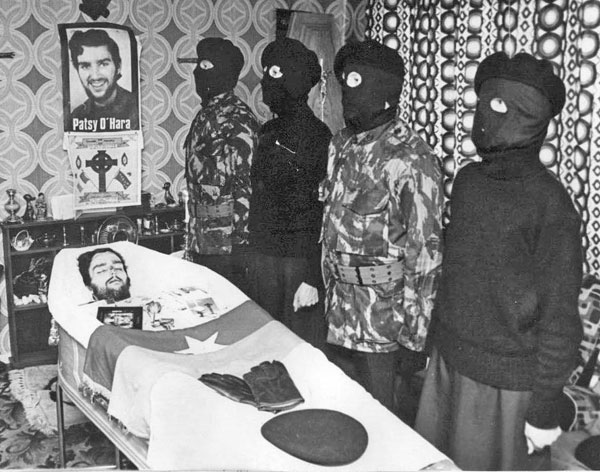20 May 2023
Raymond McCreesh and Patsy O’Hara – Died on hunger strike in the H-Blocks of Long Kesh, 21 May 1981
Died on 21 May 1981 in the H-Blocks of Long Kesh after joining Hunger Strike together
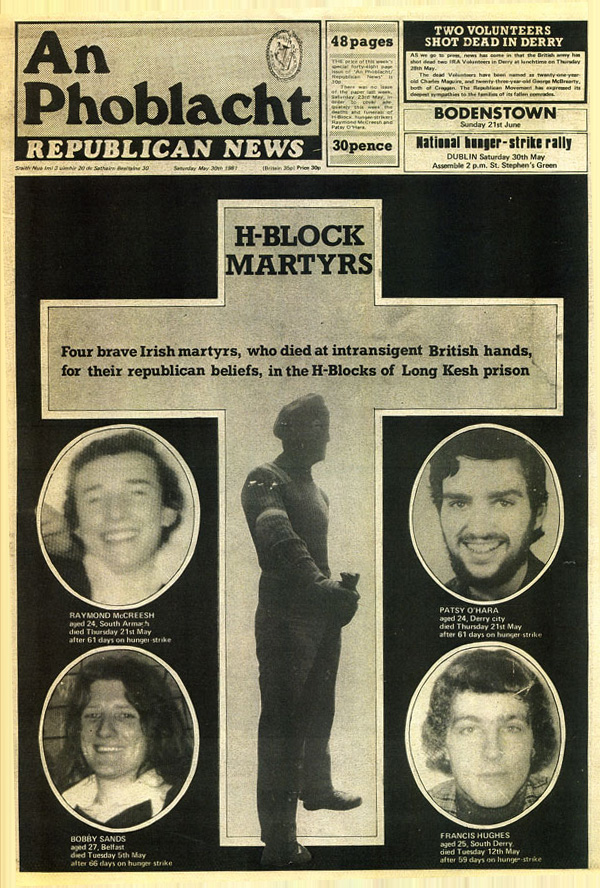
RAYMOND McCREESH was born in the village of Camlough in south Armagh on 25 February 1957, the youngest in a family of four brothers and three sisters.
After leaving school, Ray attended Newry Technical College and served a two-year apprenticeship as a sheet metal worker.
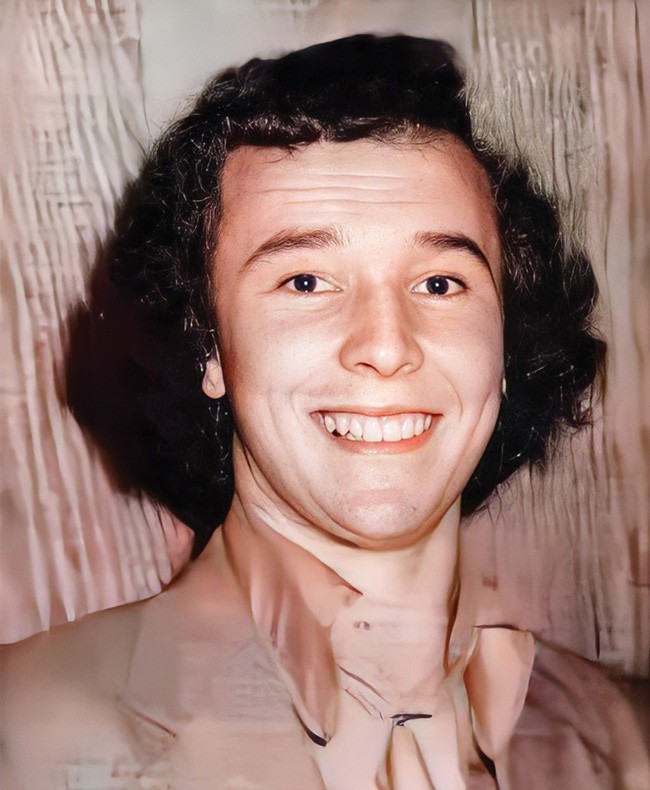
At 19, Ray was arrested after an IRA ambush on soldiers near Beleek in south Armagh in June 1976. After nine months on remand he was sentenced in a non-jury court in March 1977. Ray refused to recognise the court and was four years on the Blanket Protest – four years in which he forfeited his visits rather than wear the prison uniform for that short half-hour per month. He only took his first visit in 1981 with his parents to inform them he was going on hunger strike.
Raymond McCreesh died on 21 May 1981 after 61 days on hunger strike.
PATSY O’HARA was born in Derry City on 11 February 1957. He was only 11 years of age when, along with his parents, he took part in the big civil rights march in Derry on 5 October 1968, which was batoned by the RUC. A year later, he witnessed another of the milestones in the conflict when the RUC invaded (and were defeated) during the Battle of the Bogside in August 1969.
Patsy joined the Fianna Éireann republican youth movement in 1970 and, although under age, he joined Sinn Féin in 1971. Later in the year he joined the Republican Clubs but quickly became disillusioned with them increasingly ignoring the national question. He was frequently harassed and beaten up by the British crown forces before being interned in April 1975.
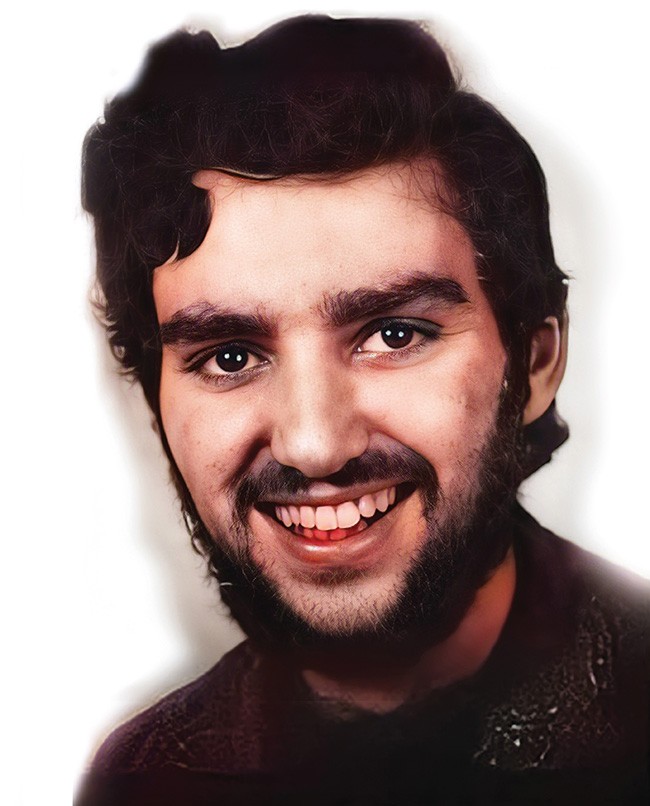
After his release he joined the Irish Republican Socialist Party. Patsy was arrested once more in May 1979, charged with possession of a hand grenade and convicted on the basis of accusations made by two British soldiers. He was sentenced to eight years’ imprisonment in January 1980 and immediately went on the Blanket Protest.
Patsy O’Hara died on 21 May 1981 after 61 days on hunger strike.
— • — • — • — • — • — • — • — • — • —
A Mass had been celebrated at Raymond McCreesh’s bedside on Wednesday evening by his brother, Fr Brian McCreesh. Raymond was semi-conscious and appeared to show some sign of recognition but died just a few hours later. His remains were returned to his beloved Camlough in south Armagh for the funeral the following Saturday.
Leaving the family home in St Malachy’s Terrace, the cortege stopped briefly at the lane outside the house where it was joined by a honour guard of IRA Volunteers, Cumann na mBan and Fianna Éireann. Led by a lone piper, the cortege paused to allow Raymond McCreesh’s comrades fire a final salute over the Tricolour-draped coffin.
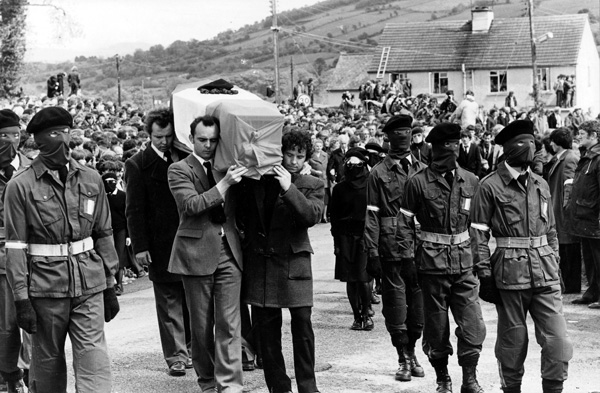
• Raymond McCreesh’s coffin, flanked by an IRA guard of honour, is shouldered by his brothers Malachy and Brian. (Below) IRA Firing party
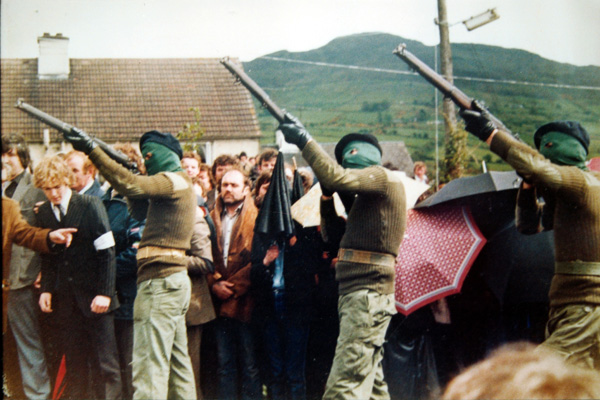
At St Malachy’s Church, loudspeakers broadcast the Mass to a huge crowd of mourners. Mass was concelebrated by five priests led by Raymond’s brother, Brian. In his sermon, Fr Wolsey criticised the British for selectively quoting from the Pope’s 1979 Drogheda speech:
“Violent means must not be used, the Pope says, to change injustices. But neither must violent means be used to keep injustices. The Pope has said so. The first passage has been over-quoted; the second one rarely heard.”
After the Mass, the funeral procession made its way the short distance to the cemetery where, in sight of the family home, the coffin was lowered into the grave. Chairing the graveside ceremonies was south Armagh republican Joe McElhaw. Defying a British Government exclusion order, Sinn Féin President Ruairí Ó Brádaigh delivered the oration. Paying tribute to Raymond McCreesh, he said:
“We are gathered here to perform a last, sad but proud duty for that great Irishman and human being, Raymond McCreesh.”
He detailed McCreesh’s progression from Fianna Éireann to the IRA and his capture in 1976 after a gun battle with the British Army. He had fought imperialism, he said, which was “the enemy of mankind”.
Ó Brádaigh outlined the area’s proud history of resistance to British rule. He accused the British Government of callously murdering McCreesh and his comrades but added that British policy was now in ribbons:
“Where now is their Ulsterisation? Where now is their normalisation? Where now is their criminalisation?
“These hungry and starving men in their beds of pain, by superior moral strength, have pushed the British Government to the wall and have shamed them in the eyes of the world.”
Comparing the Hunger Strikers to Terence MacSwiney, the Lord Mayor of Cork who died on Hunger Strike in 1921, he pledged that republicans would continue their resistance to British rule.
— • — • — • — • — • — • — • — • — • —
PATSY O’HARA passed away at 11:39pm. By his bedside were his father, James, his sister, Elizabeth, and family friend James Daly.
Speaking of his final moments his sister said: “My father called, ‘Patsy!’ and he sort of, as if he recognised the voice, sort of just tried to move his head, just one last time. And then he died. And as he was dying his face just changed; he had a very, very distinct smile on his face which I will never forget. I said, ‘You’re free, Patsy. You have won your fight and you’re free.’ And he was cold then.”
Former leader of the INLA prisoners in the H-Blocks, O’Hara came from a staunchly republican family and was much respected in his native Derry. The night of his death saw sustained rioting on the streets of Derry. The RUC replied with volleys of plastic bullets, murdering 45-year-old Harry Duffy in the process. Two days earlier they had murdered 12-year-old Carol Ann Kelly in Twinbrook.
Repeating their actions with the Francis Hughes cortege, the RUC hijacked O’Hara’s remains. Long Kesh Governor Stanley Hilditch had informed the family that the remains had been taken to Omagh, where they could be collected. About 4:30am the RUC phoned Derry with a heartless message: “If you want to collect this thing you had better do it before daylight.”
They were determined to prevent a daytime cortege. In a sickening development it emerged (after the body was finally retrieved by the grieving family) that the RUC ghouls had mutilated the body.
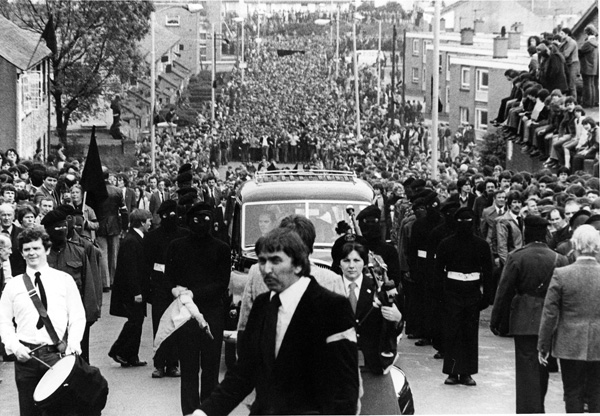
• Funeral of Patsy O’Hara, Derry. (Below) Patsy O’Hara pictured in his prison cell just one week before he died and on the day before Francis Hughes’s funeral. The film was smuggled out but unfortunately the camera and a miniature tape-recorder were discovered by the prison authorities two days later in the cell of Raymond McCreesh
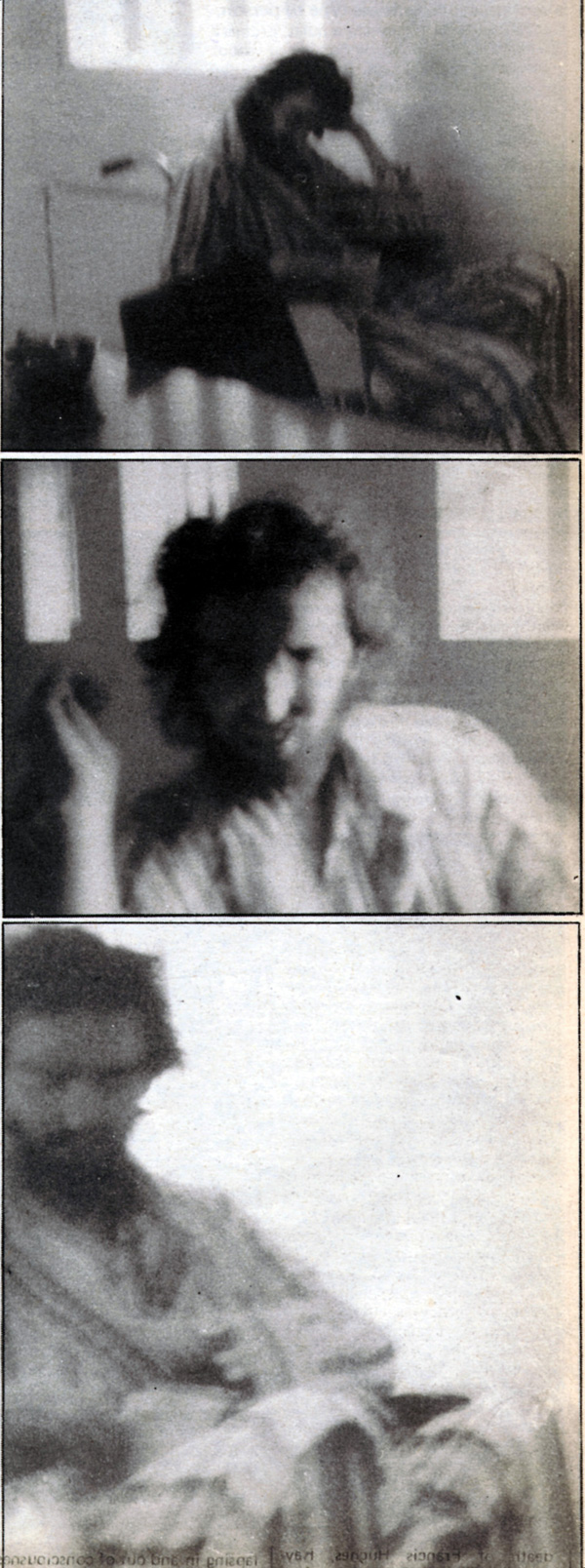
The funeral, the biggest in the city since the Bloody Sunday civil rights massacre funerals of 1972, was addressed by a number of people.
Chairing the proceedings was James Daly, husband of murdered anti-H-Block activist Miriam Daly. Patsy’s brother, Seán, compared Charles Haughey to Pontius Pilate and said the Hunger Strikes were an important victory for the cause of Irish freedom as the whole world could now see the callousness of the British.
The deaths of McCreesh and O’Hara in the H-Blocks took place against an increasingly violent backdrop outside the prison. The IRA was mounting increasingly effective military operations against the British Army, with five British soldiers killed in an ambush at Altnaveigh, south Armagh.
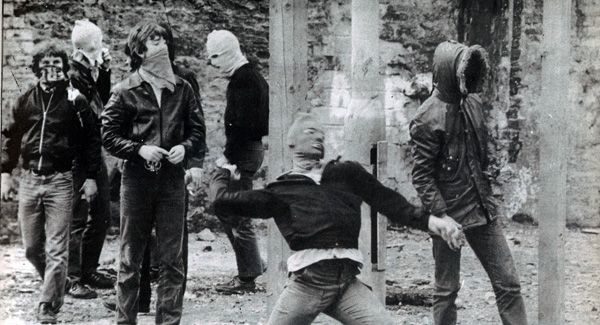
The British crown forces attempted to crush rising nationalist anger. In addition to the plastic bullet deaths of Carol Ann Kelly and Harry Duffy, there was a wave of indiscriminate plastic bullet attacks that left hundreds injured, many of them seriously, including Paul Lavelle (15) from Ardoyne who was left in a coma.
The Hunger Strike was causing a huge outcry in the 26 Counties and Taoiseach Charles Haughey was forced to give the impression of doing something, particularly in light of an impending general election on 11 June. He promoted as a serious initiative an intervention by the European Commission on Human Rights that amounted to nothing.
Just two days before her brother died, Haughey met with Patsy O’Hara’s sister, Elizabeth, during which he gave the impression that a development involving Europe was imminent and asked her for a contact number at which she could be reached. The following morning she got a call summoning her to Government Buildings in Dublin. Haughey was still pushing the European Commission angle but told Elizabeth that Patsy would have to come off the Hunger Strike to give time for a complaint to be made to the Commission. It was clear at this point that the Commission was just a diversion. Elizabeth O’Hara broke off all contact with Haughey.
There was mounting anger on the streets in the 26 Counties. Although the H-Block campaign committee was determinedly non-violent as a matter of strategy, there was a wave of incidents across the state such as the 23 May torching of a bus belonging to English fishermen in Ballinamore, County Leitrim. In a vain attempt to distract from the real issue, an Irish Government summit was called with much fanfare to discuss “escalating violence”.
A statement from the Catholic Cardinal, Tomás Ó Fiaich, said:
“Raymond McCreesh was born in a community that has always proclaimed that it is Irish, not British. When the Northern Troubles began he was barely 12, a very impressionable age at which to learn discrimination. Those who protested against it were harassed and intimidated. Then followed Burntollet, the Bogside, Bombay Street and Bloody Sunday in Derry – all before he was 15.”
The Cardinal went on to say that McCreesh would never have been in jail had it not been for the abnormal political situation.
“Who was entitled to judge him?” he asked.
The 20 May local elections in the Six Counties saw a number of H-Block candidates elected. Amongst them was Raymond McCreesh’s brother, Oliver.
International support for the Hunger Strikers soared. There were daily demonstrations in the United States. Thousands marched in protest through New York on the Saturday after the deaths of McCreesh and O’Hara. Amongst the countries that saw demonstrations, many of them large, were Australia, Norway, Greece, France and Portugal.
The deaths of Raymond McCreesh and Patsy O’Hara – who had started the strike on the same day, died on the same day and were born within a fortnight of each other in February 1957 – marked a critical escalation in the prison struggle as well as the struggle outside the prisons walls.
Follow us on Facebook
An Phoblacht on Twitter
Uncomfortable Conversations

An initiative for dialogue
for reconciliation
— — — — — — —
Contributions from key figures in the churches, academia and wider civic society as well as senior republican figures



